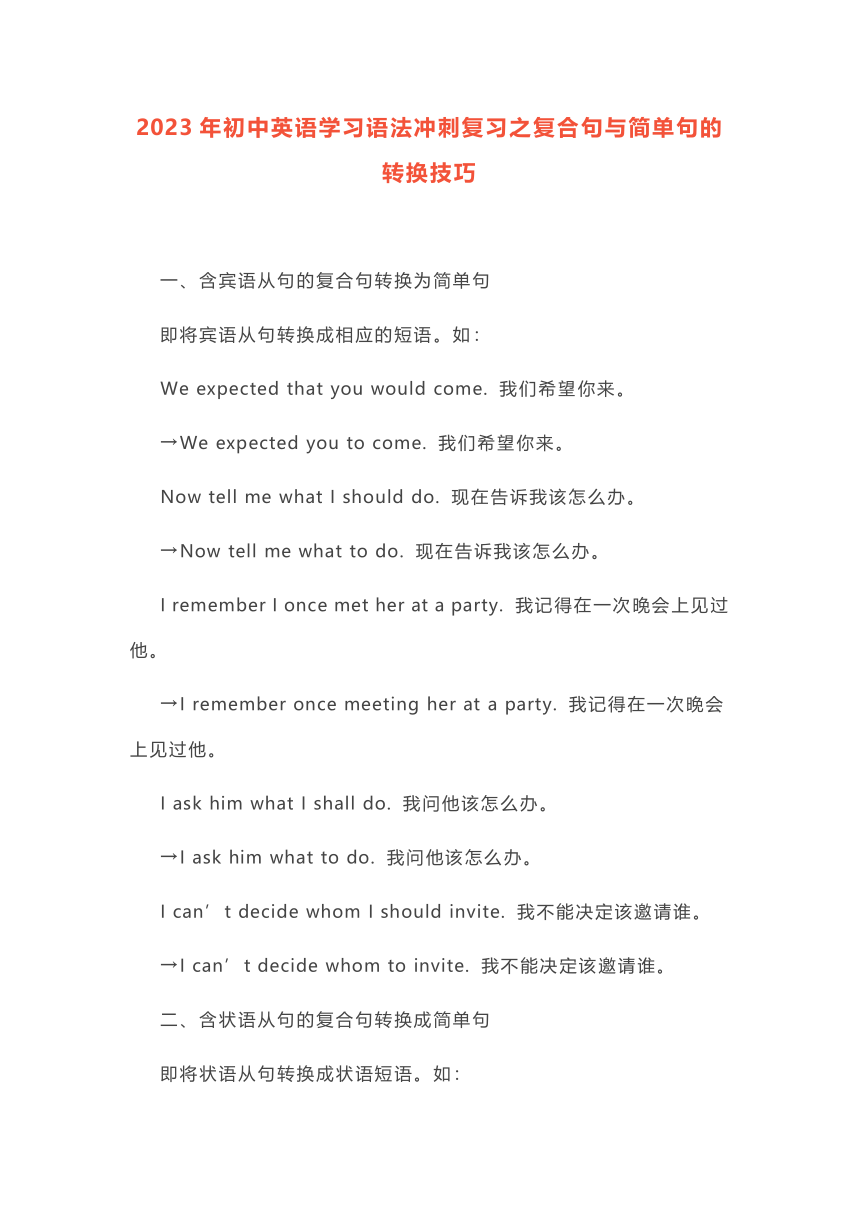
2023年初中英语学习语法冲刺复习之复合句与简单句的转换技巧 一、含宾语从句的复合句转换为简单句 即将宾语从句转换成相应的短语。如: We expected that you would come. 我们希望你来。 →We expected you to come. 我们希望你来。 Now tell me what I should do. 现在告诉我该怎么办。 →Now tell me what to do. 现在告诉我该怎么办。 I remember I once met her at a party. 我记得在一次晚会上见过他。 →I remember once meeting her at a party. 我记得在一次晚会上见过他。 I ask him what I shall do. 我问他该怎么办。 →I ask him what to do. 我问他该怎么办。 I can’t decide whom I should invite. 我不能决定该邀请谁。 →I can’t decide whom to invite. 我不能决定该邀请谁。 二、含状语从句的复合句转换成简单句 即将状语从句转换成状语短语。如: He can’t come because he is ill. 他因病不能来。 →He can’t come because of his illness. 他因病不能来。 Turn off the light before you leave. 离开前请关灯。 →Turn off the light before leaving. 离开前请关灯。 He went home after he finished his work. 他做完工作后就回家了。 →He went home after finishing his work. 他做完工作后就回家了。 He was so angry that he couldn’t speak. 他气得话都说不出来。 →He was too angry too speak. 他气得话都说不出来。 He studied hard in order that he could pass the exam. 他努力学习以便能考及格。 →He studied hard in order to pass the exam. 他努力学习以便能考及格。 句型变换·陈述句变疑问句 1. 变成一般疑问句 将陈述句变成一般疑问句,要根据陈述句中的谓语动词及其时态确定疑问形式。其句型特点一般是:助动词或情态动词 + 主语 + 谓语 + 动词 + 其他 如: The policeman told the boys not to play football in the street. _____ the policeman _____ the boys not to play football in the street 答案:Did, tell 2. 变成特殊疑问句 将陈述句变成特殊疑问句时,常用的方法是“一选,二移,三变,四代”。 “一选”就是选择疑问词,被选择的疑问代词有:what, which, who, whose;疑问副词有:where, when, why, how;疑问副词词组有:how long, how often, how soon, how far, how many, how much, how old等。 “二移”就是把be动词,助动词或情态动词移到句首。 “三变”就是将原句中第一个单词的首字母改为小写(专有名词除外),将some, something等改为any, anything等,将句号改为问号。 四代就是将选好的特殊疑问词替代划线部分。如: At the age of three, David weighed 20 kilos. (就划线部分提问) _____ did David weigh at the age of three 答案:How much 3. 变成选择疑问句 将陈述句变成一般疑问句,在问号前加上“or + 所给的被选择部分”。如: Most young men like popular music. (用 rock music 改为选择疑问句) _____ most young men like popular music _____ rock music 答案:Do, or 4. 变成反意疑问句 陈述句变成反意疑问句时一定要遵循“前肯定,后否定;前否定,后肯定”的原则。常考的六种特殊的反意疑问句是: ①在英语口语中,I am后面的附加疑问部分常用aren’t I; ②There be... 后面的附加疑问部分一般用be(not)there; ③在Let us...后面,常用will you; ④Let’s...后面,常用shall we; ⑤had better后面,附加疑问部分的助动词用had; ⑥当陈述部分是祈使句时,附加疑问部分通常用will you或won’t you。如: Miss King hardly spoke a word the whole time. Miss King hardly spoke a word the whole time, _____ _____ 答案:did she 句 ... ...
~~ 您好,已阅读到文档的结尾了 ~~